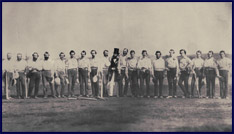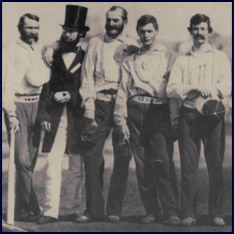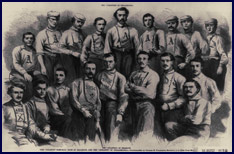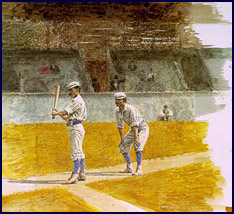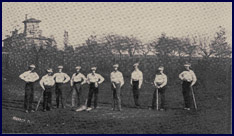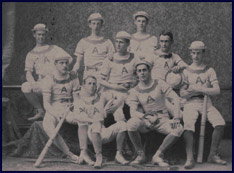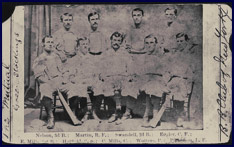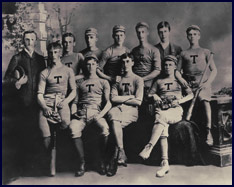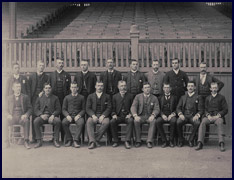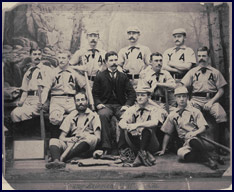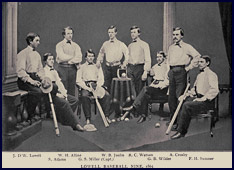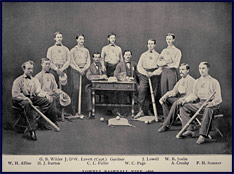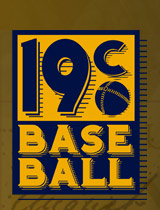
he infancy of baseball stimulated a bond between the members of each club and produced matches that had a friendlier purpose. When the game gained recognition and spectators attended in large numbers the organizers and players saw this new financial potential. On July 20th 1858, the first "Great Base Ball Match" in NY was held at the Fashion Race Course on Long Island between all-star teams made up of players from existing New York and Brooklyn clubs. The 50 cent admission was collected to cover the cost of preparing the grounds and an estimated 4,000 spectators saw the match. It is believed that this was the first time an admission fees was collected for a match. Extra stages, ferries and trains were instituted to accommodate the attendees. New York won that match, the first of three, 22-18. This game exhibited the importance of baseball in New York.
The game grew in popularity and the players of the local clubs became recognizable figures not only from their play on the field but from the reports in the newspapers. Most players were given nicknames which further helped identify them to the public. This also separated them from the public, but included the players in the growing fraternity of American athletics. The player's on-field feuds with each other as well as occasionally reported off-field issues helped them become larger than life figures.
Jim Creighton
1841–1862
Born on April 15, 1841, Jim Creighton was baseball's first real star and made his pitching debut with the Brooklyn Niagaras at age eighteen in 1859. He would join the Brooklyn Star Club that year and then join the Excelsior Club, in 1860, for "under the table inducements."
Joe Start
1842–1927
Joe Start began playing baseball during its organized infancy and retired after the game became big business, 28 years later. He played for 1 amateur team and six professional teams and attained the reputation of a well tempered, well-mannered steady ballplayer.
Bob Ferguson
1845–1894
On June 14, 1870 the Brooklyn Atlantics were playing host to the powerful Cincinnati Red Stockings at Capitoline Grounds in Brooklyn, NY. The Red Stockings last loss occurred on October 1, 1868 to the same Atlantics of Brooklyn, on the same field. Since then the Red Stockings managed to win 89 straight games (the August 26, 1869 match against Troy is considered a forfeit win since the Haymakers walked off the field). At the end of nine innings, the Atlantics walked off the field proudly with a 5-5 tie.
Paul Hines
1852–1935
Paul Hines played in 1,659 games in three leagues, from 1872 through 1891, had 2,135 hits, hit over .300 eleven times and posted a career batting average of .302. Despite his successful career, Paul Hines would be all but forgotten today if not for the fact that he was involved in thirteen major league "firsts."
Charles “Old Hoss’ Radbourn
1854–1897
A butcher by trade, Charles Radbourn received his moniker for his incredible endurance and dependability in an era when most teams employed a two-man pitching rotation. As a starting pitcher for the Providence Grays (1881-1885), Boston Beaneaters (1886-1889), Boston Red Stockings (1890) and Cincinnati Reds (1891), Radbourn compiled a 309-195 career record. In 1884 he won the National League's pitching Triple Crown with a 1.38 ERA, 60 wins and 441 strikeouts. His 60 wins in a season is a record which will never be broken.
Charles "Old Hoss" Radbourn Continued ![]()
John Clarkson
1861–1909
Although John Clarkson only pitched for 12 seasons, he complied statistics that would compare to a modern day pitcher with a twenty-three-year career. He won 328 games and lost only 178, finishing his career with a 2.81 Earned Run Average. He pitched through three distance changes, two pitching delivery changes and two starting position changes. When he retired in 1894 he was the winningest pitcher in National League history.
Charlie Ferguson
1863–1888
Charlie Ferguson was the Philadelphia Phillies' first star pitcher but his untimely death in 1888, allowed Ferguson only four National League seasons. Born on April 1, 1863, Charlie Ferguson made his debut on May 1, 1884, for the then Philadelphia Quakers. He would win 99 games in his career, never winning less than 21 games in any season. Ferguson would strikeout two and one half batters for every one that he walked, and finished with a career Earned Run Average of 2.67. He twice pitched over 400 innings in a season, including his rookie season and would average 378½ innings per year.
Albert Spalding
1850–1915
Albert Spalding had three exceptional careers in baseball. He became the best pitcher in professional baseball. After starting his own sporting goods business while still a player, he retired soon after and built the most dominant sporting goods business in America. His influenced was used to help start the National League and then used to help extinguish two rival leagues competing with National League. He then became the most influential person in baseball and was essentially the governing body of the National League into the 19th century. He seemingly was behind the decisions that the National League made regarding maintaining their attempted monopoly on baseball and would also have the distinction of spear heading the ridiculous myth about Abner Doubleday and the origins of baseball in American.
The First Player's Reserve List
1880
Historically the owners of baseball teams have not been able to control their desire to win and have proven that they will do almost anything to achieve a winning team. Constantly attempting to attain the best players, 19th century owners blindly threw money at the ballists and did not immediately see the long term effects that this money would have on future contracts and owner profits. The Reserve Clause was intended to keep the owners from outbidding each other, reduce player salaries and increase profits.
The First Player's Reserve List Continued ![]()
